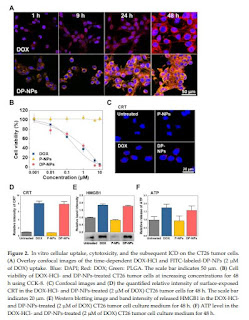Immunogenic cell death (ICD) is an immune response against cancers which can be leveraged to eliminate tumors. Recently, researchers at Korea University and Korea Institute of Science and Technology utilized PLGA (cat# AP081) from PolySciTech (www.polyscitech.com) to create doxorubicin loaded nanoparticles for inducing ICD. This research holds promise to improve therapies against cancer in the future. Read more: Kim, Jeongrae, Yongwhan Choi, Suah Yang, Jaewan Lee, Jiwoong Choi, Yujeong Moon, Jinseong Kim et al. "Sustained and Long-Term Release of Doxorubicin from PLGA Nanoparticles for Eliciting Anti-Tumor Immune Responses." Pharmaceutics 14, no. 3 (2022): 474. https://www.mdpi.com/1511014
“Immunogenic cell death (ICD) is a powerful trigger eliciting strong immune responses against tumors. However, traditional chemoimmunotherapy (CIT) does not last long enough to induce sufficient ICD, and also does not guarantee the safety of chemotherapeutics. To overcome the disadvantages of the conventional approach, we used doxorubicin (DOX) as an ICD inducer, and poly(lactic-co-glycolic acid) (PLGA)-based nanomedicine platform for controlled release of DOX. The diameter of 138.7 nm of DOX-loaded PLGA nanoparticles (DP-NPs) were stable for 14 days in phosphate-buffered saline (PBS, pH 7.4) at 37 ◦C. Furthermore, DOX was continuously released for 14 days, successfully inducing ICD and reducing cell viability in vitro. Directly injected DP-NPs enabled the remaining of DOX in the tumor site for 14 days. In addition, repeated local treatment of DP-NPs actually lasted long enough to maintain the enhanced antitumor immunity, leading to increased tumor growth inhibition with minimal toxicities. Notably, DP-NPs treated tumor tissues showed significantly increased maturated dendritic cells (DCs) and cytotoxic T lymphocytes (CTLs) population, showing enhanced antitumor immune responses. Finally, the therapeutic efficacy of DP-NPs was maximized in combination with an anti-programmed death-ligand 1 (PD-L1) antibody (Ab). Therefore, we expect therapeutic efficacies of cancer CIT can be maximized by the combination of DP-NPs with immune checkpoint blockade (ICB) by achieving proper therapeutic window and continuously inducing ICD, with minimal toxicities.”

No comments:
Post a Comment